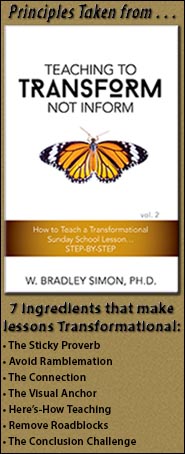How to Teach Sunday School
(The following principles are taken from Teaching To Transform Not Inform 2)
Teachers who know how to teach Sunday school have a vital ministry
Spotting a teacher who knows how to teach Sunday School is fairly easy to do. Amongst other things, they quickly gain and hold attention, clearly explain the text, help listeners remove internal roadblocks, and then challenge them to accept and apply the truth to their lives. As a result, listeners’ beliefs, thoughts, attitudes, hopes, dreams, priorities, values, and actions change over time. It is no wonder why God considers their ministry within the church to be of vital importance. Look at what Paul tells us in Ephesians:
It was he who gave some to be apostles, some to be prophets, some to be evangelists, and some to be pastors and teachers, to prepare God’s people for works of service, so that the body of Christ may be built up until we all reach unity in the faith and in the knowledge of the Son of God and become mature, attaining to the whole measure of the fullness of Christ.
Ephesians 4:11–13 NIV
Simple, practical steps and techniques for how to teach Sunday School

Even though spotting a teacher who knows how to teach Sunday School is fairly easy to do, becoming one involves integrating several different teaching principles at the same time.
For the casual observer, the teaching process appears to be straight forward: people come in, sit down, listen to some inspirational teaching, they leave, and over time, their lives change. Seems simple enough. However, what they don’t realize is the simpler the lesson appears and the more impact it has in people’s lives, the more skillfully the teacher has integrated teaching principles throughout the entire lesson. When done correctly, teaching principles are invisible and the lesson just works. When done incorrectly, the teaching process comes to a grinding halt.
How to teach Sunday School using more effective techniques
Let’s look at a common example. Have you ever noticed how some teachers can ask a question and everyone just sits there. Answers are given, but often just to alleviate the awkward silence. Other times, teachers can ask a question, and it is difficult to get a word in edgewise because everyone is trying to give their opinion.
What makes the difference? Why did one teacher’s question result in an awkward silence while the other sparked a ten minute discussion? It all comes back to the teacher's understanding of how to teach a Sunday School class. It comes back to their ability to integrate teaching principles invisibly and effectively. Few, if any, probably noticed how the teacher directed the class discussion to prepare them for the upcoming, carefully crafted question. The class just assumed everyone was talkative that day. Everyone experienced the effect, but few realized the cause. To fully understand how it happened, you usually can’t just watch the teacher in action; rather, most of the time, you need someone to point out how they taught the Sunday School class; what principles they used, why they used them, and how they affected listeners.
>> To learn more about how to teach a Sunday school class, see chapter 1 in Teaching to Transform Not Inform 2: How to Teach a Transformational Sunday School Lesson...STEP-BY-STEP.
The “Teaching To Transform Not Inform” series gives a simple, practical, step-by-step method to those wanting to know how to teach Sunday School.
How to Teach Sunday School Tip: Without a commitment to explain, prove, and apply a specific timeless truth, it is easy to wander from verse to verse displaying interesting, yet lesser, side points.
Find more links on how to teach Sunday School, see the following:
- How to Grow Your Sunday School
- Goal of Teaching Sunday School
- How to be a Sunday school teacher
- How To Teach Sunday School
- Why Teach Sunday School
- Sunday School
- by Brad Simon
Book 1 - Foundational principles for how to teach Sunday School | Book 2 - How to teach Sunday school lesson elements |
|---|---|
| Most of the time you Teach More by Teaching Less | The 7 Ingredients needed for Transformational Lessons |
| God Uses Imperfect People Like You and Me | The Sticky Proverb |
| Create a Ripple That Continues Into Eternity | The Conclusion Challenge |
| How to Teach Sunday School | Avoiding Ramblemation |


